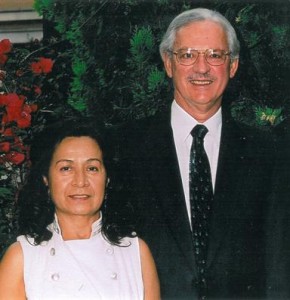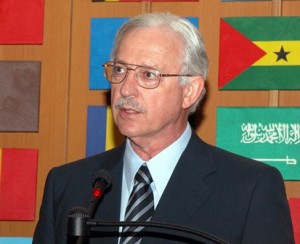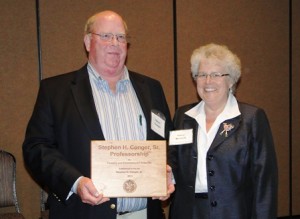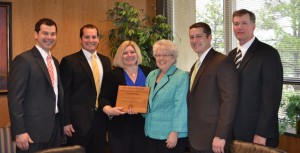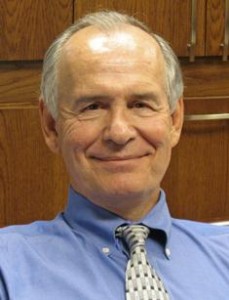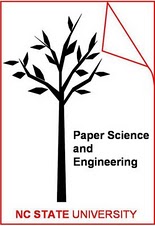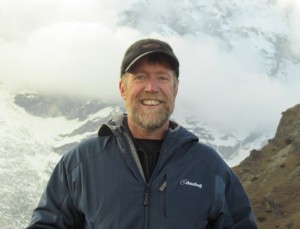 L. Scott Mills, a 1983 alumnus, re-united with North Carolina State University this July as a faculty member. Scott is part of the Chancellor’s Faculty Excellence Program in Global Environmental Change and Human Well-Being. The Chancellor’s Faculty Excellence Program is bringing the best and brightest to join NC State to promote interdisciplinary scholarship and innovation for solving the globe’s most pressing problems.
L. Scott Mills, a 1983 alumnus, re-united with North Carolina State University this July as a faculty member. Scott is part of the Chancellor’s Faculty Excellence Program in Global Environmental Change and Human Well-Being. The Chancellor’s Faculty Excellence Program is bringing the best and brightest to join NC State to promote interdisciplinary scholarship and innovation for solving the globe’s most pressing problems.
Scott Mills is a Professor in the Department of Forestry and Environmental Resources in the College of Natural Resources, a member of the Fisheries, Wildlife and Conservation Biology Program, and looks forward to collaborating with the College of Agriculture and Life Sciences, the College of Sciences, the NC Museum of Natural Sciences, and the USGS Southeast Climate Science Center.
Dr. Lara Pacifici, also new to NC State as Assistant Teaching Professor and Undergraduate Coordinator of the Fisheries, Wildlife and Conservation Biology Program, had the recent opportunity to ask Dr. Scott Mills some questions about his past and future:
Pacifici: After 18 years at the University of Montana, what influenced you to come to North Carolina State University?
Mills: I have deep roots in North Carolina; I grew up here in Raleigh, and my family history here goes way back (my great-great grandfather was a mathematics professor at Wake Forest College in 1866, when it was a single building in the town of Wake Forest). So in some ways I’m responding to the tidal pull to come back to this part of the world. As an NCSU alum, I have always admired this university, especially in the Natural Resources fields; really, NCSU is one of the few universities with a program strong enough that I’d consider leaving Montana for! I am elated to be back at NCSU as a professor, to give back a bit for all I gained here as a student and citizen.
Pacifici: What are your research and teaching interests?
Mills: I am a wildlife population ecologist, meaning that I combine field data, population models, and genetic tools (including non-invasive genetic sampling in the wild) to understand population and community-level effects of human stressors on wildlife. I am also active in developing more efficient and rigorous approaches to population assessment, monitoring, and conservation decision-making.
My teaching has included graduate and undergraduate classes – and short courses for agency biologists – in applied population ecology, conservation genetics, population viability analysis, general ecology, and field techniques.
As for research, for many years I have focused on projects in mountainous landscapes. I am heavily involved in helping to build local capacity for wildlife biology research in the Himalayan Kingdom of Bhutan, where two of my graduate students are currently using non-invasive genetic sampling and remote cameras to study snow leopards and tigers. We have a book coming out that provides practical, ‘how-to’ overviews of wildlife research techniques in mountainous Asian landscapes.
My students and I have also used field studies, genetic analyses and population models to guide conservation and management of other species ranging from marmots in Olympic National Park confronting invasive coyotes, to endangered Sierra Nevada bighorn sheep, to flying foxes in the Philippines, to small mammals along forest edges, to declining amphibian species. I am also continuing my research on snowshoe hares that has been going for 15 years (more on that in the next question).
While I will keep much of this research going, I’m also excited about going some totally new directions with local species and questions. Not sure what those new research questions will be, but I’m looking forward to getting ideas from folks here!
Pacifici: You’ve done a great deal of work on snowshoe hare predatory prey dynamics – https://vimeo.com/67839982. Will you continue that work?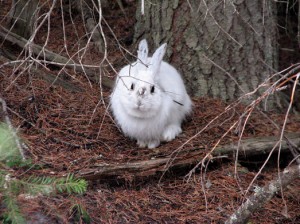
Mills: Yes. Having spent 15 years working to understand hare population dynamics and response to logging (and the powerful role of predation), I am now focusing on whether hare camouflage can adapt to climate change. Like many species across the globe, hares change from brown to white seasonally to match their background. Because the change is based on daylength, they turn white whether or not snow is present. As duration of snow during winters decreases due to climate change, what does that mean for these white hares on a snowless background? The question is key because it will help us understand the ability of animals to locally adapt to climate change, thereby improving the decisions we make in managing wildlife in the face of climate change and other global stressors. To study how animals might adapt to climate change requires a multi-disciplinary approach, so we are combining radiotelemetry and field studies with global climate prediction models, as well as gene expression and hormone assays. We are even building here, at the Vet School, one of the world’s first facilities to house animals that undergo seasonal coat color molts.
I will continue the work with snowshoe hares, whose southern range in the east coast extends down to Virginia, and I will also extend the studies to other species that undergo coat color molts, such as weasels. While it might seem a little strange to have, here on NCSU campus, a big research program on animals that turn white (and including a sub-freezing animal facility), it makes sense if you consider that this project is very high profile, addresses critical questions for understanding climate change effects on wildlife, and is poised to prosper in the rich collaborative environment of the NCSU campus community. For example, the sub-zero hare facility we’re building at the Vet School (which has been nicknamed the ‘Bunny Chiller’ by some) couldn’t be built most places because of the varied expertise required in animal husbandry, engineering, and construction; the team helping me here at NCSU is second to none. In short, the expertise of my new colleagues at NCSU will help us answer aspects of adaptation to climate change that are critical to society and that are not being addressed anywhere else.
Pacifici: What experiences stand out most in your memories of your time as an undergraduate at NCSU?
Mills: I worked hard and played hard. Many a night I studied up in the stacks of D.H. Hill, but weekends I would head out for bass fishing nearby or rock climbing in the mountains (one night, to test out a new rope, we rappelled out of a Tucker Dorm window; the police officer standing at the bottom was shaking his head and gave us a big lecture). I was a features writer for the Technician, and had memorable interviews about milking contests, spider webs, and making beer. I remember talking with Dr. Roger Powell (Mammalogy prof) as one of his pet weasels ran loose in his office. A powerful class moment was a field trip to Lake Matumuskeet, where Dr. Phil Doerr showed us a swan dying of lead poisoning, a visceral symbol of the importance of banning lead shot from waterfowl hunting (this finally happened a few years later). Another memorable night was the student chapter of the Wildlife Society banquet at my grandparent’s pond in Wake Forest. And finally, my senior year was 1983, so I was a participant in the celebrations on the brickyard when the Cardiac Pack won the NCAA championship!
Pacifici: How do you hope to contribute to the NCSU community of scholars?
Mills: I have always valued collaborating across disciplines, and that is what most excites me about my new position here at NCSU. My work touches on field ecology, genetics and genomics, computational modeling, evolutionary biology, and climate modeling, all in an applied context of working with managers and policy makers, so my hope would be to connect with folks at NCSU across all these topics. Because I’ve been hired as part of the Chancellor’s Faculty Excellence Program cluster in Global Environmental Change and Human Well-Being, my job will be to span across from the Department of Forestry and Environmental Resources in CNR (and the Fisheries, Wildlife and Conservation Biology Program) to the College of Agriculture and Life Sciences, the College of Sciences, the NC Museum of Natural Sciences, and the USGS Southeast Climate Science Center. And of course, I want to continue to help mentor students, graduate and undergraduate, in the research process.
Pacifici: What words of wisdom do you have for current or prospective students in Fisheries, Wildlife, and Conservation Biology?
Mills: Realize that you are in the greatest profession in the world, a job where you have fun every day yet also are helping to make the world a better place. This profession connects us to nature, first and foremost. The animals and plants that speak to us in our personal metaphorical or perhaps literal way: really, they are our constituents; they are the voiceless constituency that we dedicate our careers to.
And at the same time, we are gifted with a remarkably powerful scientific basis to use as we do our job, a science as rigorous as medicine, or aeronautics, or economics, physics, or molecular biology.
So at the end of our career, we will be one of the few who can say that we loved what we did, we made a difference, and we worked for the right reason.
Which is not to say that we do not have challenges, immense challenges.
Never before has our planet faced as many stressors with such intense focus. At the same time, our field has developed faster, much faster, than the public’s perception of our field. This means that much of the public often feels that intuition, their own intuition or intuition of others, is still enough to guide top-tier wildlife management. Although it can be frustrating when the power of our science isn’t used, I don’t see that as a tragedy or travesty or even a surprise. After all, our roots were in observation of nature and thoughtful intuition, and we still learn every day from our own experiences in nature, and from other careful observers. So we find contentment in doing our job and in seeing a growing awareness of how and why wildlife science can intersect with public perception and human dimensions.
So: Be a good student from day one, because what we do is too precious to do it poorly. And take it upon yourself to be a student both in the classroom and also in nature, becoming an observant naturalist. Flip rocks in a creek and see what’s under them. Lay in a meadow and see what passes by. Take binoculars into a patch of woods and lean against a tree and look and listen and smell. Study tracks in the mud. Use field guides, and write and draw in a field journal about what you observed. Have fun and take good notes because the world depends on you!
You can read more about his research at http://research.cnr.ncsu.


